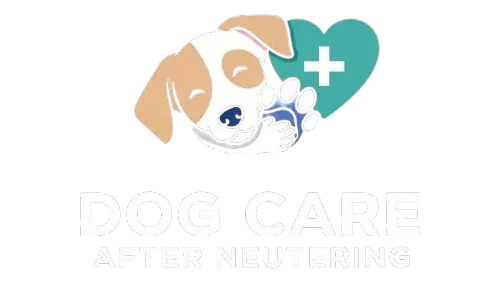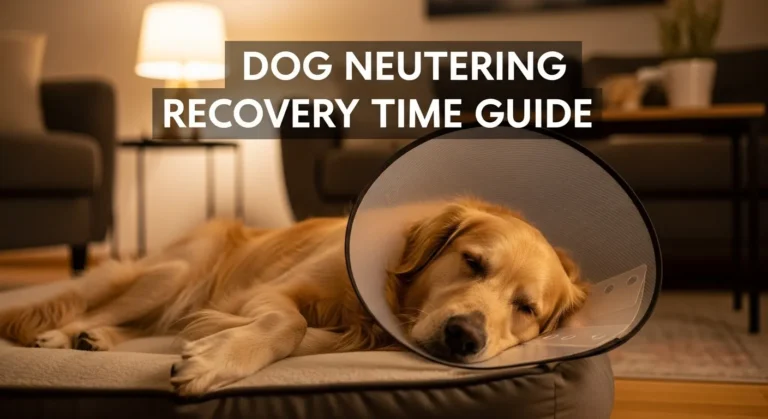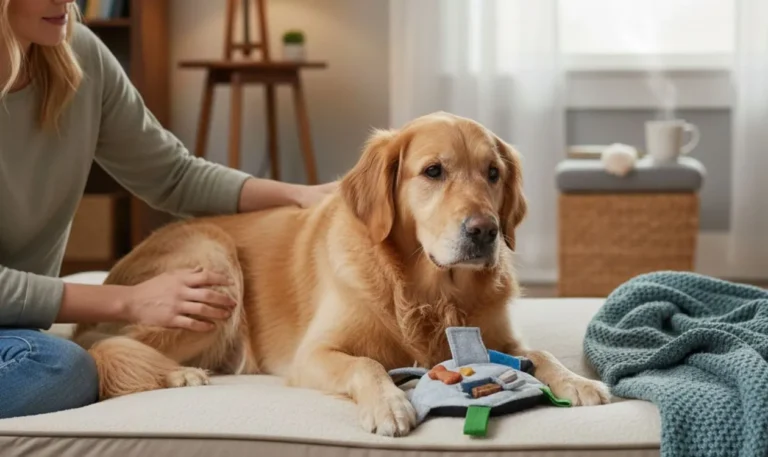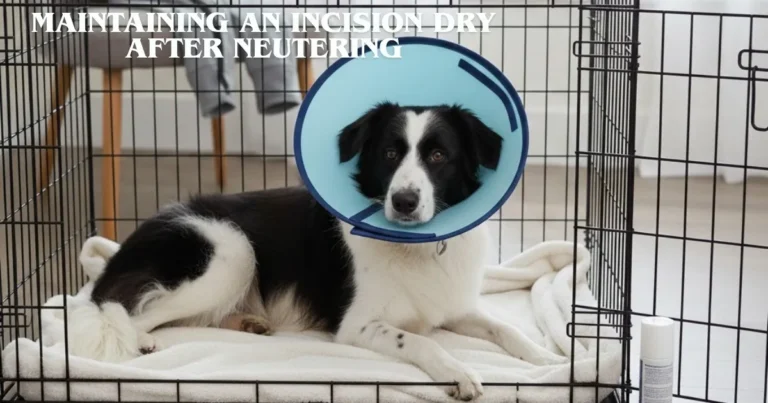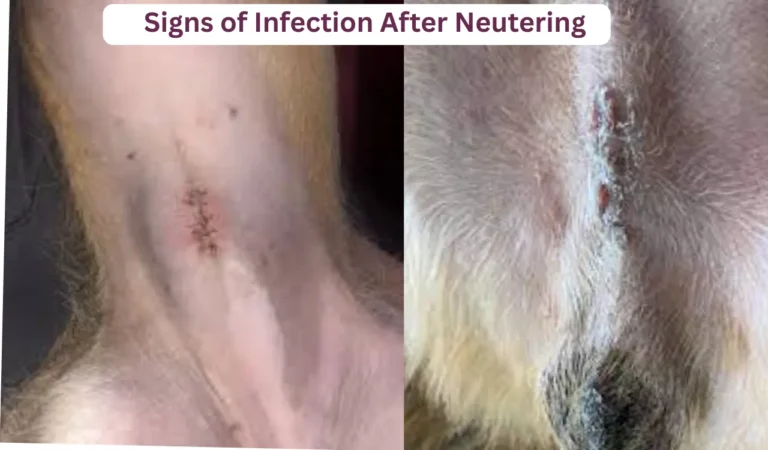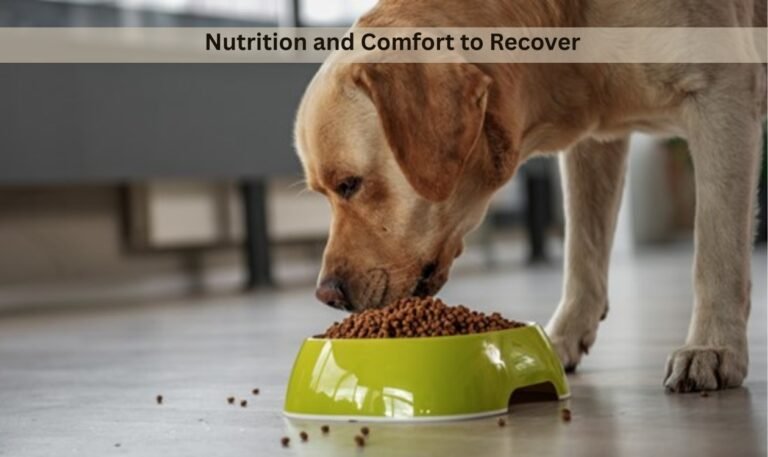Feeding Anxious Dogs Post-Surgery : A Complete Nutrition & Recovery Guide
feeding anxious dogs post surgery requires gentle care, small meals, and calming support. Learn tips to reduce stress, improve appetite, and aid safe recovery.
The issue is that it is not always easy to feed anxious dogs after the surgery, particularly when discomfort and stress influence the appetite of a dog. Surgery is usually followed by weakness of the body and emotional stress which leads to lack of interest in food. It is better to know what your dog needs at this sensitive moment and this way, the healing process will be easier. Adequate nutrition is significant in healing and general prowess.
Dogs can be hungry but refuse to eat because of pain, medication or anxiety caused by the unfamiliar sensation. Owing to the fact that you have pets, you should treat them in a gentle and patient manner when it comes to feeding them. The eating is made easier by a calm environment, soft foods and supportive routines all make eating easier. This is the guide that you should know when feeding anxious dogs care after surgery.
Question of why dogs get anxious after surgery
Surgery may be frightening to dogs due to the new odors, the medical environment, and the effects of anesthesia. When they wake up, they may feel disoriented, which increases their anxiety. Stress also comes from pain and physical discomfort, making dogs reluctant to eat. This emotional response is a normal and instinctive reaction to sudden changes.
The time spent in the recovery process tends to introduce limited mobility which may further introduce frustration and impatience. Medications that make dogs feel drowsy or nauseated also confuse the dogs. A combination of these factors lowers the appetite and food interest. These triggers can be used to provide support that enhances eating habits and health.
Nutrition is an important issue in post surgical recovery.
Nutrition is needed to heal tissues, restore the strength, and help the immune system. Delicious food gives the body of your dog the energy it requires to heal faster. Proteins, vitamins, and minerals are all essential in the healing of wounds and inflammation reduction. Lack of proper nourishment will make recovery harder and slower.
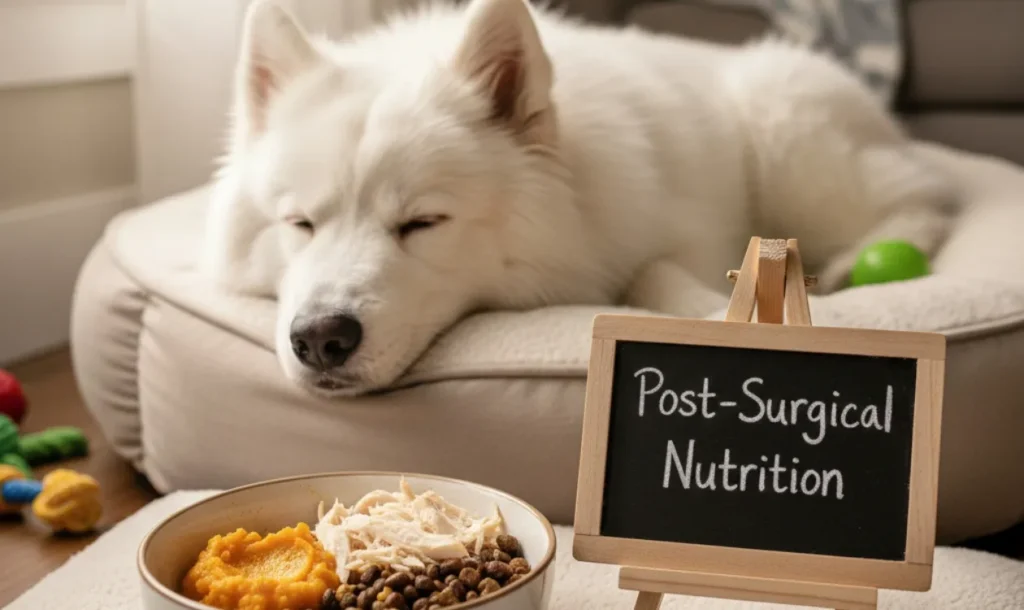
Balanced diet is useful to keep the blood sugar at a stable level and to achieve the comfort of the digestive system. This will avoid weakness, irritability, and other stress on the body. To feed anxious dogs after surgery, it is necessary to select those foods that are soft and rich in nutrients. Pay attention to those meals that are easily chewable, easily digested and can be tolerated in the early stages of healing.
Light and Easy to Digest Post-Exercise Foods.
Soft food will assist with the mechanical effort of reducing chewing, which will make mealtime more pleasant to dogs in pain. Wet food, chicken that has been boiled, rice, and bone broth are smooth on the stomach and easy to swallow. These alternatives can offer warmth and aroma and stimulate the eating habits of dogs. Soft foods are also effective in keeping the patient hydrated and digestively balanced.
It is best to use low-fat, bland diets when medication affects appetite or digestion. Excessive, fatty, or heavily seasoned foods should be avoided because they irritate the stomach. Gradually reintroduce variety as your dog begins eating normally. Simple, soothing meals can go a long way in improving feeding success during recovery. This gentle approach supports calm and steady healing.
Staffing a Relaxed Feeding Environment.
An atmosphere of peaceful conditions reduces anxiety and stimulates eating. Do not keep your dog with loud noises, playing children or other pets around during the meal hour. The nervous dogs can be made more comfortable with soft lighting and silent room. Put their food bowl in an empty and comfortable position.
You should not hover over your dog because this will cause the pressure or nervousness. Instead, sit close to them and assure them so that they are not interrupted. It is also significant to have routine, such as feeding during the same time of the day to ease stress. These minor modifications bring the feeding of nervous dogs after surgery to a lot more manageable.
How to use Appetite Enhancers safely.
There are cases when anxious dogs require additional support to resume eating. Natural appetite stimulants such as warm broth, wet food toppers, or small amounts of boiled meat can help enhance appetite. These additions improve food by making it more aromatic and appealing. They also provide hydration and essential nutrients, offering a supplementary boost during recovery.
Appetite stimulant food, which is recommended by veterinarians can also be useful in cases where the dog has a very low appetite. It is always best to heed the recommendation of your vet as far as dosage and safety is concerned. Do not feed the dog on human food that might be poisonous to dogs. Moderate consumption of appetite enhancers would make sure that your dog consumes without failure to recover.
Treating Nausea and Drug Side Effects.
The use of drugs that are administered after surgery can lead to nausea, drooling, or a short-term stomachache. In case of these symptoms in your dog, you should feed him in smaller portions more often. Slow feeding also prevents vomiting, and pressure on the digestive system is decreased. Refreshing, bland meals will defuse stomach aches
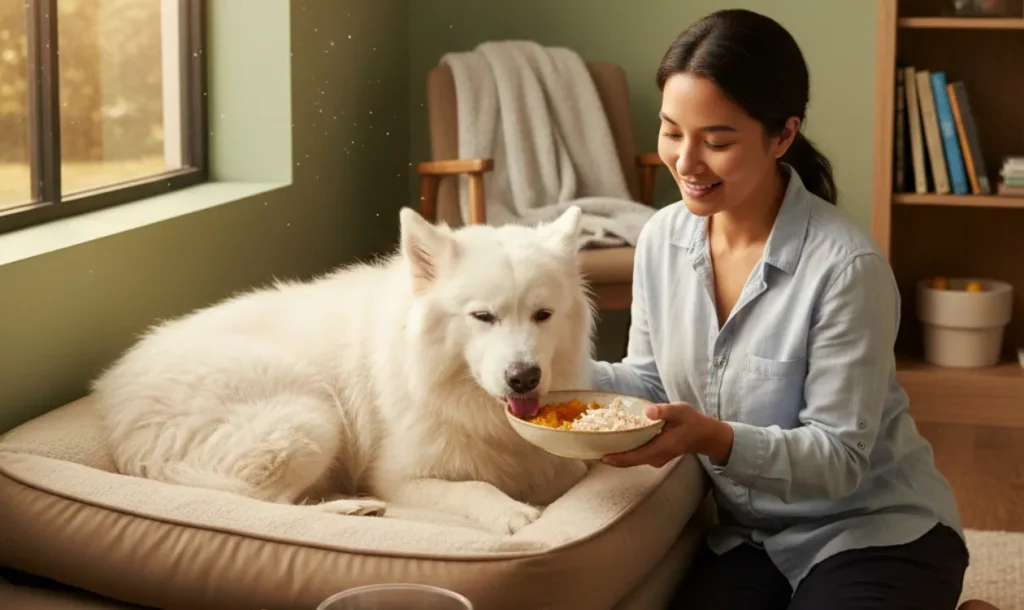
Do not force-feed a nervous or nauseous dog, this will only exert more stress and can cause more discomfort. In case of persisting nausea, call your veterinarian to change the drugs or prescribe anti-nausea aid. Early treatment of such symptoms makes your dog feel good and develop better feeding habits.
Rehydration: An important aspect of Recovery.
Numerous nervous dogs consume less water post-surgery, placing them at risk of dehydration. Providing wet food or adding water to meals helps maintain natural hydration levels. Drinking can also be encouraged with bone broth or diluted low-sodium broth. Maintaining your dog’s water intake supports digestion and helps reduce pain. This hydration-focused care is essential for smooth recovery.
Watch the amount of water that your dog drinks closely in the process of recovery. Anxiety can be accelerated and the healing process can be slowed when dehydration occurs. Give clean water in a clean accessible bowl all through the day. Promoting frequent drinking helps to maintain a stable amount of energy and general recovery.
Gradual Reintroduction of normal Diet.
The process of returning to a normal diet is not easy, and it depends heavily on how anxious your dog feels. Begin by adding very small amounts of their regular food to recovery-friendly meals. Gradually increase the quantity of regular food as their appetite begins to return. This method helps avoid digestive upsets and allows your dog to settle comfortably. Following this recovery guide ensures a safer and smoother transition back to normal eating.
Watch your dog because it should either be soothing, bloated or have diarrhea in the transition. In case of problems, go back to soft foods in the meantime. The gradual and gradual effect of a gradual process is a guarantee to gradual recovery to normal eating habits. This way assists in long term gastrointestinal health and assurance.
Observation of Eating Habits and Behavior.
Monitor the eating behavior of your dog, weight gain and loss, as well as behavior change to maintain a stable recovery. Unusual refusal to eat or anxiety can be the signs of unpleasant experience or complications. Monitor energy, bowel movements and fluid intake. Such indications make you notice the early issues.
To make sure that the dog is making progress, visit your veterinarian regularly. Disclose any fears or atypical behavior so that they may change care, where necessary. Regular observation will make sure your dog has a lower level of anxiety in feeding overtime. Deliberately and thoughtfully, eating becomes more convenient and pleasant once more.
FAQs: Feeding Anxious Dogs Post-Surgery
Final Thoughts
It takes time, soft tactics, and comfort to feed nervous post-operative dogs. You help in better nutrition habits by preferring soft food, providing a relatively calm environment, and regulating the impact of medication. Each dog is healed in his or her time, thus it is important to be familiar with their emotional and physical needs. As time passes, anxiety is reduced through constant care.
Slow absorption of normal meals is a guarantee of stable digestive system and long-term health. Observing the behavior and supportive nutrition assist your dog to feel safe as he or she is recuperating. By doing this right, you will have your dog back on track by gradually regaining his or her confidence and appetite. Patient care, regular schedule eases the process of healing.
